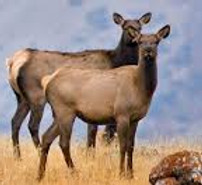EAGLE RANCH ASSOCIATION
Eagle, Colorado


Living with Wildlife
Portions of Eagle Ranch are considered critical wildlife habitat and are winter ranges elk and deer. These areas within our community have been designated as open space to prevent any future development and growth.
Crossing Paths with Wildlife
As Colorado’s population and desire for outdoor recreation increase, the proximity of humans to wildlife habitats can disrupt wildlife.
In most situations, though, people and wildlife can easily coexist. The key is to respect the wildness of wildlife. Wildlife is just that - wild. Most dangerous and potentially harmful encounters occur because people fail to leave the animals alone. Wildlife should not be harassed, captured, domesticated or fed. Intentional or inadvertent feeding is the major cause of most wildlife conflict, and it is illegal to feed deer, bighorn sheep, mountain goats, pronghorn, and elk in Colorado.
-
Observe animals from a distance. Never approach wildlife. Limit the time you observe them.
-
Never chase or harass wildlife. Keep your dogs on-leash to avoid any potential conflicts.
-
Let animals rest and do not do anything to make them move.
Wildlife Collisions
Wildlife-vehicle collisions can happen year-round at any time. There is an increase during the winter migration season, especially between dusk and dawn hours, when animals move to lower elevations for the coming winter. Deer & Elk are extremely vulnerable to being struck at this time of year.
-
Slow Down: Driving more slowly increases your reaction time and reduces chances of a collision.
-
Stay Alert: Especially when driving at dusk and dawn. This is when wildlife are more active and likely to cross the road.
-
Scan Ahead: Scan ahead and watch for movement on the sides of the roadways and look for shining eyes in your headlights. Always be prepared for more than one animal.
-
Traffic & Wildlife Signs: Obey traffic signs and watch for wildlife warning signs.
Leash Law Ordinance
In the Town of Eagle, Colorado, dogs must be leashed within the town boundary, except at the Eagle Dog Park. The town contracts with Eagle County Animal Services to enforce the leash law and educate the community about it.
Even the best dogs can chase, injure, kill wildlife, or be injured themselves.
-
Eagle Ranch Golf Course require dogs to be on-leash at all times.
-
Town of Eagle Open Space require dogs to be on-leash at all times.
-
Eagle Ranch Recreation Trails require dogs to be on-leash at all times.
The town maintains a designated off-leash area at its dog park, which is in the fenced area located adjacent to Sylvan Lake Road, near the intersection of Lime Park Drive.
Wildlife in your Backyard
Most conflicts between people and bears can be traced to human food, garbage, pet food, bird seed or other attractants. When people allow bears to find food, a bear’s natural drive to eat can overcome its wariness of humans. Bears that get too comfortable around people can destroy property or even become a threat to human safety.
While mountain lions are generally an elusive animal who avoids interaction with humans, there are some common sense measures that can be taken to protect yourself and your pets when living in lion country.
Please read Bobcats, Mountain Lions and Lynx FAQs for additional background information on this species.
Moose have very few natural enemies in the wild and, as a result, do not fear humans as much as most other species. Moose tolerate humans longer and at closer distances. They are extremely curious and often will approach humans or houses. For these reasons, it is extremely important to understand moose behavior when living in or visiting the areas they inhabit.
While moose encounters with people are quite common, moose cause few problems. However, moose can and will "tree" people who have approached them too closely, kill or injure pets or livestock, and chase people or dogs away from territories they are defending. Caution and common sense go a long way in preventing problems with moose.
Helping is Harming
It's human nature to want to help wildlife, but it's important to remember wildlife aren't humans or pets. Handling or feeding wildlife can cause unintended danger.
Don't Feed Wildlife
Intentional or inadvertent feeding is the major cause of many wildlife problems. Under Colorado law, intentionally feeding deer, elk, pronghorn, mountain goats, bighorn sheep, mountain lions and bears is illegal. This law protects both animals and people as feeding wildlife is more harmful than helpful.
Don't Rescue Young Wildlife
Young wildlife don't need to be rescued.
You may see more young wildlife during spring months in Colorado, including deer, elk, pronghorn, moose, rabbits, foxes and birds. Because of this, Colorado Parks and Wildlife receives an increase in office visits and calls each spring from people who report they "rescued" young wildlife. People should know they do more harm than good by taking what they believe to be orphaned young wildlife from the wild. As wildlife becomes more visible in backyards, open spaces and on trails in the spring, Colorado Parks and Wildlife asks people not to disturb young wildlife.
Wildlife Aren't Pets
Colorado Parks and Wildlife takes a conservative stance to owning wildlife in order to maintain our unique ecosystem and protect the animals.
You cannot remove a wild animal in Colorado and take it home as a pet. Colorado Parks and Wildlife regulations do not allow keeping any state-regulated wildlife as pets, even if those animals are allowed in other states. Even when you hand-raise a wild animal, it still maintains its wild behaviors.




